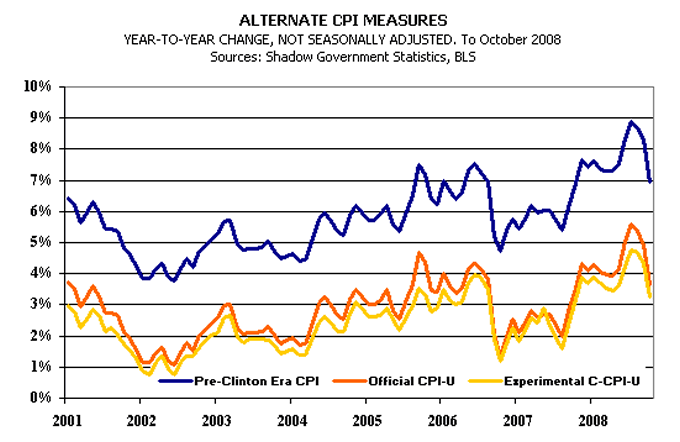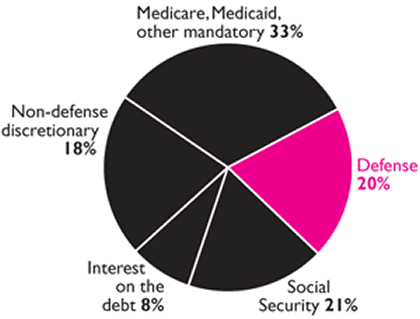Manipulated Inflation Statistics An Undisclosed Act of Treason
Economics / Market Manipulation Nov 21, 2008 - 11:09 AM GMTBy: Rob_Kirby
 For those of you who are unfamiliar with the work of John Williams of Shadow Government Statistics fame; this missive should prove to be quite an eye opener. For those who are familiar with Williams' work – this is nothing more than logical extension[s] and conclusions.
For those of you who are unfamiliar with the work of John Williams of Shadow Government Statistics fame; this missive should prove to be quite an eye opener. For those who are familiar with Williams' work – this is nothing more than logical extension[s] and conclusions.
Walter J. "John" Williams was born in 1949. He received an A.B. in Economics, ***** laude, from Dartmouth College in 1971, and was awarded a M.B.A. from Dartmouth 's Amos Tuck School of Business Administration in 1972, where he was named an Edward Tuck Scholar. During his career as a consulting economist, John has worked with individuals as well as Fortune 500 companies.
So, let's just say the man knows of what he speaks.
The thrust of Williams' work deals with identifying and documenting the intentional falsification of official, governmental, economic reporting – particularly as it relates to inflation:

What folks need to realize is that market rates of interest are historically set at;
Inflation Rate + 250 [or so] basis points
What follows from this is, “if you understate inflation, you end up with lower market rates of interest than you otherwise would have”.
Why Officialdom Lies About Inflation
With a show of hands, have any of us ever met a politician who did not hold the fundamental belief that “they” know better how to spend our money than us – the folks who earn it?
Not surprisingly, I didn't see many raised hands.
We all intuitively know that whenever large pools of money are earned or aggregated – ANYWHERE IN THE ECONOMY – government types tend to eye these accumulations of wealth as potential bonanzas.
This was evidenced recently over at the Wall Street Journal, where Alan Reynolds opined, where Obama will get $4.3 trillion dollars to fund all his new programs? As the Optimistic Patriot recently reported, they're already floating a trial balloon that would net them $4.5 trillion:
House Democrats recently invited Teresa Ghilarducci, a professor at the New School of Social Research, to testify before a subcommittee on her idea to eliminate the preferential tax treatment of the popular retirement plans. In place of 401(k) plans, she would have workers transfer their dough into government-created “guaranteed retirement accounts” for every worker. The government would deposit $600 (inflation indexed) every year into the GRAs. Each worker would also have to save 5 percent of pay into the accounts, to which the government would pay a measly 3 percent return….
Conversely, whenever government finances are “stretched”, they tend to look for ways to cut or decrease program spending without upsetting their constituents [donors].
Because governments tend to not-live-within-their-means, and engage in expensive altruistic pursuits like wars, they run fiscal deficits. Unchecked, accumulated fiscal deficits pile-up, year in and year out, to the point where interest expense becomes a TARGET – one of the largest line-items in governments' expenses.
And as interest expense on the national debt is the fastest growing component of the federal budget , prominent mention of interest expenses in spending and taxation debates would portray a much clearer picture of the nation's finances.
The Federal Budget

I mention all of this to show that a] – governments have [and always have had] a propensity to spend on programs, and, b] – if interest expense assigned to existing government debt were to, say, double – we can clearly see in the pie-chart above that deep cuts would necessarily have to be made to other budget items.
So, in conclusion, we know that methodology of measuring inflation has in fact been changed – for the benefit of governments' finances - resulting in market rates of interest “lower” than they otherwise would be. This was all done with the complicity of beholding Bureaucrats, The Federal Reserve and U.S. Treasury.
Driven To Bankruptcy: The Promulgation of Unintended Outcomes
To be sure, the Big 3 U.S. auto companies have made mistakes – like flying corporate jets to meetings where they beg for money. For a period of time [like the 1980s] they also did not seem so concerned with the quality of their product but they have made marked progress in recent years in this area. But now let's try to understand why some of these bad decisions were made.
How many of us have read news reports in recent years concerning auto companies bleak financial situations arising from their burgeoning pension [health care] costs?
Some Background On Pensions:
Auto workers' pension plans were, for the most part, devised and modeled by actuaries 50 – 60 years ago. The framers of these plans were smart. They well understood the math, or rather, the demographics of their work forces. They knew and were able to model and plan how much capital would need to be set aside over the years to meet their future obligations. Implicitly, in their models – these actuaries used “assumptions” on expected rates of future return; namely, that fixed income investments would return a minimum of the real inflation rate + 250 [or so basis points].
It should also be understood that pensions – broadly – fall into two broad categories:
Defined Benefit Plans - In a defined benefit pension plan, an employer commits to paying its employee a specific benefit for life beginning at his or her retirement. This type of pension plan was more common pre 1980s.
Defined Contribution Plan - In a defined contribution pension plan, the amount of the contributions is set in advance. The amount of the eventual retirement income is not set in advance. A member's retirement income will depend on several factors, including the total amount accumulated in his or her account:
• the member's contributions, if any
• the employer's contributions
• sums transferred to the member's account, if any
• interest earned
Most pensions today [since 1980] are Defined Contribution Plans.
Understanding how changes in inflation reporting have adversely impacted the auto company's pension plans is KEY to understanding why the auto companies are in the financial straight-jackets they now find themselves in.
Auto companies labor contracts stipulate that pensions are of the Defined Benefit variety. Additionally, labor contracts with the car companies have traditionally required the car companies to keep their pensions “fully funded” meaning that any shortfall in pension performance required the subject company to “top up” the fund out of operating revenue.
So, as health care costs escalated in the real world at the real world inflation rate – PENSION ASSETS [or the fixed income portion thereof] were only earning a FALSE rate based on corrupted or “rigged” interest rates.
To get your head around how debilitating this was:
In recent years General Motors has had pension assets under management of roughly 100 billion. Their asset mix is roughly considered to be along traditional lines of 55% - 65% invested in equities and 35% - 45% invested in bonds [fixed income]. Using the mid-point on the fixed income allocation, this means, by extension, that GM's pension assets have roughly 40 billion invested in bonds [fixed income] or equivalents.
Now, if interest rates are 500 basis points lower than modeled expectations – this amounts to a 2 billion per year shortfall in pension asset return from that which was modeled! This cancerous shortfall has been funded year-in-and-year-out by the auto companies and has CATEGORICALLY had a material impact on their financial demise. These funds were not available to be reinvested back into operations to improve the product.
The situation the described above is a logical outcome which confirms and reinforces the work of John Williams. This is an outcome that has afflicted virtually all legacy defined benefit pensions – from the steel industry to the airlines. They've all shared, more or less, the same fate arising from benefit costs being bourn in the real world versus income being derived by falsified fixed income benchmarks.
Everyone should be aware that, in the same way the rigging of interest rates - through falsification of inflation data – has wreaked unintended havoc on the car company's balance sheets – it [along with the rigging of the gold price] has produced similar complications in the financial industry. By mis-pricing the cost of capital – in the same way this creates asset bubbles – inefficient choices were made in terms of what size cars and trucks to build too! After all, why would anyone have been concerned? Capital was cheap!!!
Market rigs have been directly responsible for asset bubbles arising from the misallocation of resources. They have, in turn, also undermined confidence in the U.S. Dollar as the world's reserve currency.
What we can say is that the discipline of honest money, and a freely trading market [not rigged] in gold, would have revealed the falsification of inflation data early on – which is exactly why it was simultaneously subverted.
Ben Bernanke and Hank Paulson know all of this and they've both directly benefited from the perpetuation of these deceptions.
This has ALL been engineered.
By Rob Kirby
http://www.kirbyanalytics.com/
Rob Kirby is the editor of the Kirby Analytics Bi-weekly Online Newsletter, which provides proprietry Macroeconomic Research. Subscribers to Kirbyanalytics.com are benefiting from paid in-depth research reports, analysis and commentary on rapidly unfolding economic developments as well as recommendations on courses of action to profit from chaos. Subscribe here .
Copyright © 2008 Rob Kirby - All rights reserved.
Disclaimer: The above is a matter of opinion provided for general information purposes only and is not intended as investment advice. Information and analysis above are derived from sources and utilising methods believed to be reliable, but we cannot accept responsibility for any trading losses you may incur as a result of this analysis. Individuals should consult with their personal financial advisors before engaging in any trading activities.
Rob Kirby Archive |
© 2005-2022 http://www.MarketOracle.co.uk - The Market Oracle is a FREE Daily Financial Markets Analysis & Forecasting online publication.
Comments
|
abakhaya
27 Nov 08, 04:00 |
inflation
Hi read this for a another view on how inflation should be claculated. http://blogs.24.com/hubertmooolman |



